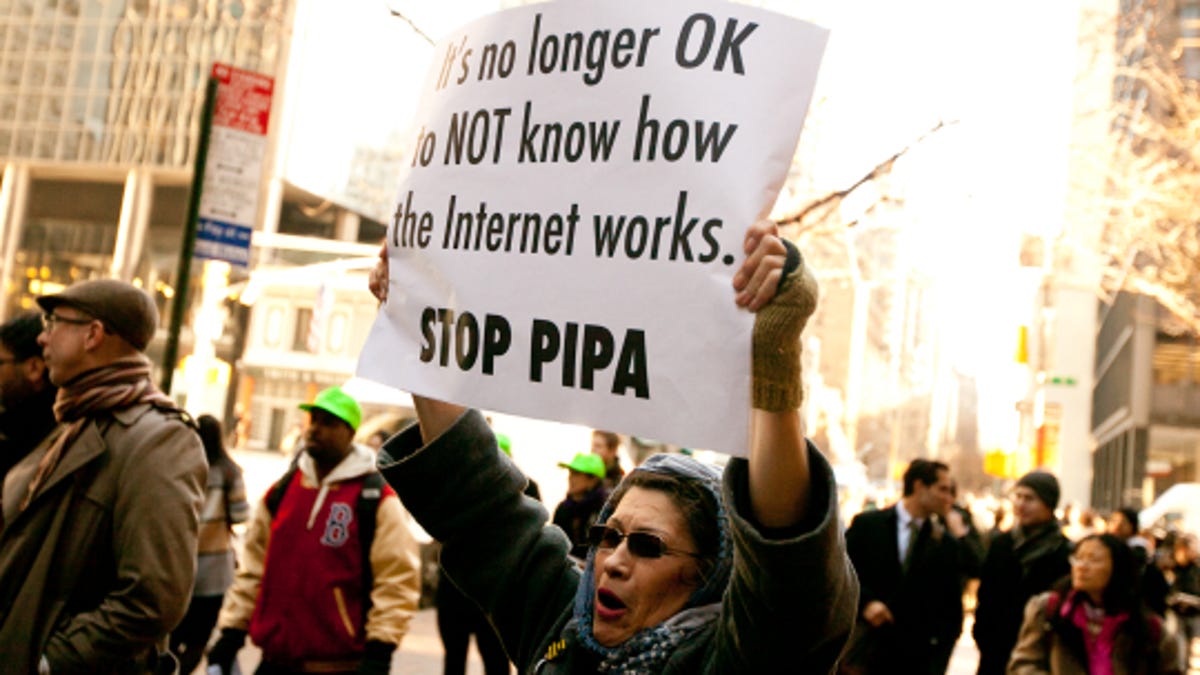Hollywood's gentler post-SOPA strategy: A charm offensive
In a new charm offensive, Paramount Pictures says it's "humbled" by last month's protests over the Stop Online Piracy Act and Protect IP--and wants to talk.

Hollywood is responding to the defeat of a pair of controversial copyright bills last month with a new strategy: a charm offensive.
Paramount Pictures sent letters last week to universities saying the company was "humbled" by last month's online protests that involved millions of Internet users--and that it now wants to "exchange ideas about content theft" and the best way to thwart it.
The letters were signed by Alfred Perry, Paramount's vice president for worldwide content and outreach. Paramount is a subsidiary of Viacom and one of the members of the Motion Picture Association of America, an ardent supporter of the Stop Online Piracy Act and the Protect IP Act, which are designed to target offshore Web sites accused of piracy.
The MPAA, too, has toned down its attacks on SOPA's opponents. Before the protests, MPAA chief Chris Dodd called the blackouts an "irresponsible response," a "gimmick," an "abuse of power," and an effort to "intentionally skew the facts." By contrast, the MPAA last week merely characterized them as a "vigorous online piracy debate."
"Along with various others, I'm still mulling my response," says Julie Cohen, a professor of law at Georgetown University who received one of the letters. "This shouldn't be taken to suggest that there will be a concerted response, just that people are discussing possibilities."
Perry's letter suggests that he or a colleague could "give a formal presentation followed by an open discussion period" or "join for a session of an existing course or seminar." See CNET's FAQ on SOPA.
The success of last month's outcry, which involved by some estimates over 10 million Internet users, appears to have taken the MPAA and its allies by surprise.
Since the late 1990s, with rare exceptions, Hollywood-backed proposals to expand copyright law--the Digital Millennium Copyright Act, the Induce Act, the Pro-IP Act--have slipped through Congress with bipartisan support. (The U.S. Senate approved the DMCA unanimously.)
But what initially seemed like another easy political win for Hollywood and large copyright and trademark holders was thwarted by an insurmountable obstacle: a remarkable protest last month that, by some accounts, involved more than 10 million Internet users. Wikipedia went dark for a day; Google and Amazon.com posted anti-SOPA warnings on their home pages; irate voters overwhelmed the U.S. Senate's Web site and demonstrated to politicians that Internet users could be a potent political force.
Now "the question is how to respond," MPAA spokesman Howard Gantman told CNET this afternoon.
Michael Fricklas, Viacom's general counsel and executive vice president, told CNET that his company's outreach effort has been going on long before SOPA and represents a way to try to "keep the debate on IP balanced." In an e-mail message, he said:
Regrettably, a lot of things are being said about piracy, intellectual property, copyright and the like (and the legislation) that either aren't true, or present only a part of the story. Often positions ascribed to us are strawmen assigned by others in order to knock them down. One person heard a speech I gave at Yale a couple of years ago and thought it was very fair, expressing surprise that we were strong supporters of fair use and said "we always thought everyone in the content community was a "copyright maximalist!" (I'm not sure what that actually means, but as an organization that covers news (including the fake kind) and popular culture, we rely on fair use every day.) So we are continuing our efforts to be a part of the discussion and think we are entitled to be there. People don't have to agree with us, but they will be better equipped to decide for themselves if they hear our perspective.
In addition, News Corp. subsidiary Fox said last week that it will send a representative to a discussion of SOPA and Protect IP scheduled for this Friday at Stanford University. (Disclosure: This reporter is also participating in the event.)
SOPA, of course, represents the latest effort from the MPAA, the Recording Industry Association of America, and their allies to counter what they view as rampant piracy on the Internet, especially offshore Web sites. It would allow the Justice Department to obtain an order to be served on search engines, Internet service providers, and other companies, forcing them to make a suspected piratical Web site effectively vanish.
While SOPA and Protect IP may be moribund--thanks in large part to bipartisan support fracturing--their backers have vowed not to give up. "We must take action to stop" online piracy and counterfeiting, Senate Majority Leader Harry Reid, a Democrat, said last month. And a statement from the White House said that "online piracy by foreign Web sites is a serious problem that requires a serious legislative response."
Dozens of the companies and groups involved in the blackouts sent a letter today (PDF) to Congress warning politicians against trying to rush through a new set of bills. "The concerns are too fundamental and too numerous to be fully addressed through hasty revisions to these bills," the letter says. "Nor can they be addressed by closed door negotiations among a small set of inside-the-beltway stakeholders."
Among the letter's signers: Amnesty International, Cheezburger Network, the Electronic Frontier Foundation, the Internet Archive, Mozilla, O'Reilly Media, Public Knowledge, Tucows, Twitpic, and WordPress Foundation.
Eric Goldman, a professor of law at Santa Clara University who was not contacted by Paramount, says unless any copyright-related event is organized carefully, it may not be very illuminating.
"When I've organized or attended panels that featured both Hollywood insiders and vigorous opponents, my experience has been that the conversation tends to gravitate towards one or two irresolute debates: High-level philosophical debates, or bogus statistics debates," Goldman says. That, he warns, only reinforces "the audience's pre-existing beliefs."
Last updated at 4:15 p.m. PT

